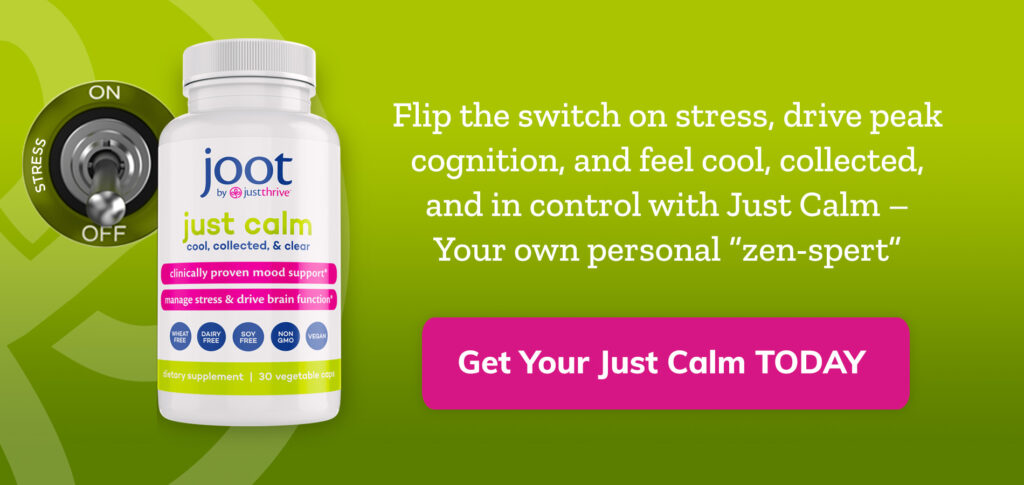Table of Contents[Hide][Show]
What’s putting you on edge these days?
Are you stressed out over work? Fighting with your significant other? Overwhelmed by inflation and rising gas prices?
Or maybe you can’t even pinpoint exactly what is making it so hard for you to feel positive.
You just know that you don’t.
It’s even more frustrating when you’ve tried some of the most common mood boosters—meditating, spending time in nature, exercising, getting quality sleep—yet you’re still left with a sense of sadness or dissatisfaction.
If that’s the case, it’s time to think outside the box. Or in this case, outside the brain.
Because as it turns out, the key to calming your nerves, boosting your mood, and reconnecting to your inner joy might be found in one of the most unexpected of places…
Your gut.
Believe it or not, your gut doesn’t just influence how you feel physically. It also impacts your emotional and mental health.
Let’s explore the connection between your gut and your mood, and how you can improve both of them.
The Gut-Brain Connection
There’s no denying the connections between your digestive health and mental health!
You get butterflies in your stomach when you see your partner. You feel slightly nauseated when you have to speak in front of a crowd. “Tummy troubles” give you anxiety when you need to use a public restroom.
That’s because your brain and your gut share a direct link known as the gut-brain axis, or GBA. This is how they talk to one another. And those signals, both positive and negative, flow in both directions because your GBA is a two-way communication system.
That’s partly why scientists consider your gut to be your “second brain.” And much like your brain is composed of neuronic cells, your gut is home to your enteric nervous system (ENS), which contains hundreds of millions of nerve cells.
Your ENS sends signals to your central nervous system (CNS) along the vagus nerve (a major cranial nerve extending from the brainstem down to the abdomen). This is how your gut and your brain communicate with each other.
Interestingly, exactly “what” your gut and brain talk about—as well as the health and effectiveness of your entire GBA system—is heavily influenced by your gut microbiome (the trillions of gut bacteria that end up guiding your mood).
And, just as importantly, psychobiotics can alter that conversation, giving it a positive twist that’ll boost your mental health and put a smile back on your face.
What Are Psychobiotics?
The bacteria in your gut is categorized into two main types: beneficial probiotic bacteria and harmful pathogens.
When your gut microbiome falls out of balance—a state called dysbiosis—pathogens outnumber probiotics and cause all sorts of problems throughout your body.
That includes your brain.
Many studies show that dysbiosis greatly interferes with healthy brain function…and can even derail it.
Since dysbiosis can also impact sleep and how your body handles stress, keeping your gut microbiome in healthy balance is a must for a happy, healthy brain.
And that’s where psychobiotics come in.
If you monitor your gut health, you’ve probably heard of probiotics. These are beneficial (or “good”) bacteria, similar to the good bacteria already found in your gut, that are found in food, drinks, and supplements.
Probiotics join forces with the other good bacteria in your body, creating strong, thriving colonies of beneficial bacteria in your gut microbiome. And since your gut has limited “real estate” for bacteria, probiotics also crowd out the pathogenic (or “bad”) bacteria.
Probiotics end dysbiosis and restore balance to your gut microbiome, for a bacterial win-win!
Aside from helping your good bacteria flourish, probiotics deliver a number of health benefits, including treating or preventing:
- Digestive issues such as diarrhea or constipation
- Irritable Bowel Syndrome (IBS)
- Inflammatory Bowel Disease (IBD)
- Yeast infections
- Urinary tract infections
- Eczema
Even better, there are some specific types of probiotics that confer mental health benefits. These are known as psychobiotics.
Psychobiotics are probiotics that use your GBA to positively influence your mood, lower stress, and reduce anxiety and depression.
Related
Anxiety and the Gut: How They’re Connected
Let’s explore the connection between anxiety and gut health, as well as ideas for improving the health of both.
How Bacteria Impacts Your Mood
So can bacteria really make you happy? You bet!
Of course, we’re not talking about just any bacteria. Your kid sneezing on you or the dirty door handles in public places probably won’t make you smile.
But the psychobiotic bacteria in your gut microbiome have an enormous impact on your mental health, brainpower, and mood.
In fact, it’s been shown that psychobiotics help keep you calm and brighten your spirit in three important ways.
- They produce “feel-good” brain chemicals (neurotransmitters) such as serotonin, dopamine, and GABA that keep your mood up and your stress levels down.
- They help regulate stress hormones like cortisol so they don’t spiral out of control, imprisoning your body in a constant state of emergency.
- They produce short-chain fatty acids (SCFA) such as butyrate and propionate that help protect the brain from toxins and connect to and expand the brain’s reward system.
But here’s the trick when it comes to feeling your brightest: you need the right bacteria in your gut to be calm, cool, and collected (while keeping stress under control). And that means making sure you’re getting enough psychobiotics.
Increasing Your Psychobiotic Intake
Now that you know the importance of these mood-boosting superheroes, you’re probably ready to bump up your psychobiotic consumption. But where do you start?
While all psychobiotics are probiotics, not all probiotics are psychobiotic. So just bumping up your yogurt intake or drinking more kombucha won’t necessarily have the mood-positive impact you’re looking for.
In fact, only certain strains of probiotics can make your mind happy and healthy.
The Most Powerful Psychobiotic for Positivity
Many probiotic bacteria can help contribute to optimal brain function and a helpful mood, but one, in particular, stands out above the rest in making calm positivity your reality.
It’s a recently discovered special probiotic strain known as Bifidobacterium longum 1714™ (BL1714), and its favorable impact on mental health has the scientific community excited.
So far, research has confirmed that BL1714 helps your body manage stress without breaking a sweat. It essentially turns off your stress “switch” so your whole body and brain have a chance to relax and regroup. It does this by cradling your cortisol levels and helping your brain’s own stress-coping mechanisms function properly.
Though the research on BL1714 is just kicking into high gear, here’s what human clinical studies have shown us so far.
- A study in Translational Psychiatry showed that BL1714 helps maintain healthy cortisol levels and reduced participant’s perception of their daily stress.
- BL1714 reduced beta wave activity—which is connected with nervousness—for volunteers subjected to social stress in a 2019 study. At the same time, BL1714 increased theta wave activity, which is associated with calmness and creativity.
- Another study showed BL1714 helps people maintain healthy sleep quality and sleep duration even while under exam stress.
And that’s just the start of what BL1714 can do! Its impact on your mental well-being can reach farther with the help of some special nutrients: the B vitamins.
As the building blocks of a healthy body, B vitamins have a direct impact on your mood, energy levels, cognitive function, and metabolism. Your body uses these essential vitamins in nearly all of its feel-good neurotransmitter recipes.
Science has shown that a particular cocktail of vitamins—B6, B9, and B12—helps support key neurotransmitter production, healthy brain function, and encourages a healthy mood.
It’s even been proven that this B trifecta can help reduce work-related stress and support emotional health.
Related
Work-Life Balance: 9 Tips For Finding Achievement and Enjoyment Every Day
In a world where busyness and hyper-productivity are valued, employees sometimes feel guilty when they find time to relax and enjoy themselves. And if you’re struggling to find the right balance between your professional and personal life, you’re not alone. A whopping 66% of full-time employees do not strongly believe that they have a good …
Psychobiotic Supplements
Think you’re the only one not feeling happy lately? Think again!
The stats on the current state of mental health are alarming. According to studies, 8 in 10 U.S. adults feel so much stress they say it’s affecting their physical wellbeing.
While sleep loss, low energy, and illness are the most common telltale signs of stress, it’s also linked to some of the world’s most persistent health problems, such as:
- Heart disease
- High blood pressure
- Obesity
- Diabetes
- Autoimmune disease
- Liver dysfunction
- And of course, anxiety and depression
The bad news? You can’t escape everyday stressors.
The good news? Psychobiotic supplements give you the exact strains of bacteria you need to stay calm, clear, and positive.
Our favorite is Just Calm, the mood-supporting “mind-biotic” from Just Thrive. Just Calm contains the clinically studied Bifidobacterium longum 1714™ plus a supportive blend of the brain-nourishing B vitamins (B6, B9, and B12).
Other Psychobiotic Benefits
If you’re like most people, you sometimes struggle to keep your mind working at peak performance to feel nimble, sharp, and clear.
That “mentally sluggish” feeling can be both frustrating and disruptive. It can impact your ability to focus, amplify feelings of overwhelm, and can put a quick stop to any hard-won motivation.
To get your gray matter moving again, you may have already tried playing brain games or taken brain-boosting herbs. If you’re reading this, you probably exercise and try to eat a clean and healthy diet.
But psychobiotics can unlock your brain’s fullest capacity, peak performance, and resilience.
For optimal brain performance, you’ll want to unleash the power of Bifidobacterium longum 1714 (BL1714™), the same psychobiotic strain that reduces stress and improves your mood.
This unique psychobiotic directly supports mental performance, ups your concentration game, and can even lock in memories.
Equally as impressive, BL1714™ sparks your brain cells while also helping to ease mental fatigue—you know, when your brain just wants to clock out for the day.
Final Thoughts
Your gut and your brain are constantly talking to one another. And you can steer the conversation in the right direction with happiness-enhancing psychobiotics.
Psychobiotics are a specific type of probiotic (“good” bacteria) that confer mental health benefits. They can lift your mood, reduce stress and anxiety, and give you back that calm, collected sense of inner peace.
A happy, healthy gut equals a happy, healthy brain!
You May Also Like…






